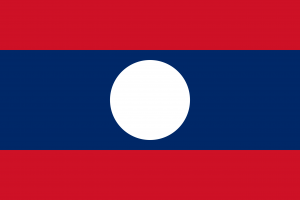Language/Lao/Vocabulary/Feelings-and-Emotions
Hi Lao learners! 😊
In this lesson, we will learn about feelings and emotions in Lao. We will cover the most common adjectives to express emotions and feelings. We will also provide cultural information and interesting facts related to these keywords. By the end of this lesson, you should be able to express yourself with more precision and describe your emotions better.
Finish this lesson and explore these related pages: Body Parts & Days of the Week.
Basics[edit | edit source]
Before we dive into emotions and feelings, let's start with some essential vocabulary that you might use while expressing your emotions:
| Lao | Pronunciation | English |
|---|---|---|
| ເລີຍ | ley | hi |
| ສະບາຍດີ | sabai dee | fine, thank you |
| ຂໍຂອບໃຈ | khokhoi saai | congratulations |
| ຂອບໃຈ | khoi saai | happy |
| ຄືນເທົ່າ | kuen thuao | sad |
| ແບ່ງຄຳ | baeng kham | sorry |
| ຂ້າພະ້າຊາດ | kha pha saad | good luck |
Emotions and Feelings[edit | edit source]
Now let's focus on emotions and feelings!
Happy[edit | edit source]
Feeling happy is universal, and Lao people are not an exception. In Lao, the word for happy is "khoi saai". It is pronounced "khoi" like "coy" in English, and "saai" is pronounced like "sigh" in English.
To express your happiness in a specific situation, you can use the following useful phrases:
- ຂ້ອຍເກີດຂ່າວໃນນອກ (Khoi keda khao nau nok) - I feel happy eating with you.
- ຂ້ອຍຍັງເລີຍຮັກເອົາຂ່າວ (Khoi yang ley hak eau kaaw) - I am very happy to meet you.
Did you know that Lao people celebrate the Lao New Year, which is called "Pi Mai"? It is a joyful and colorful celebration that lasts three days. Many people visit their families, give presents, and pour water on each other as a symbol of blessing and renewal.
Sad[edit | edit source]
Feeling sad can be challenging, but it is essential to know the words that can describe how you feel. In Lao, the word for sad is "kuen thuao". It is pronounced "kuen" like "kwun" in English, and "thuao" is pronounced like "thou" in English.
Here are some examples of how to use it:
- ຂ້າວ່າກິນຂອບໃຈຫລາຍ (Kha wai kin khoi lay) - I feel sad because I miss you.
- ຂ້າວ່າຈິດກັບແຈ້ງຕາມເພື່ອປີ້ນ (Kha wai jit kua jaeng tam phuem pi nong) - I am sad to say goodbye.
Lao people also have a ceremony to honor their ancestors called "Boun Khao Padap Din," which is held around September or October. They believe that their ancestors' spirits will come to bless them, and it's a way to demonstrate their respect and gratitude.
Angry[edit | edit source]
Feeling angry is another intense emotion, and it can be expressed in Lao with the word "ເຈົ້າແຈ້ງ" (chao jaeng). It is pronounced "chao" like "chow" in English, and "jaeng" is pronounced like "jane" in English.
Here are some examples of how to use it:
- ຂ້າກ່ອນ ຂ້າກ່ວາແຈ້ງ (Kha kon koi kwa jaeng) - I feel angry at him/her.
- ຂ້າຄົນຕາຍເຈົ້າແຈ້ງ (Kha khon tam jao chao jaeng) - The person is angry at me.
In Lao culture, it is essential to be patient and not show your anger in public. Instead, people prefer to talk face to face and resolve their issues in a polite and respectful manner.
Excited[edit | edit source]
Feeling excited is a positive emotion that can be expressed in Lao as "ເຊື້ອຈິດ" (seua jit). It is pronounced "seua" like "sua" in English, and "jit" is pronounced like "jeet" in English.
Here are some examples of how to use it:
- ຂ້ອຍເຊື້ອຈິດຢູ່ນ້ອງແລ້ວ (Khoi seua jit yung nong laeo) - I am excited to go there soon.
- ຂ້ອຍປະມານເຮົາໄດ້ກໍໄປແຊ່ງໄປໃນເວີຊີນ້ອຍຊົມເຊີ້ງໃນແລ້ວ (Khoi phamanh hao dai khom harm sesing nong som seng nai laeo) - I am excited that we can finally join together in our vacation soon.
In Lao culture, it is common to celebrate the end of Buddhist Lent, which is called "Boun Ok Phansa." People join boat races, eat sticky rice, and give offerings to the monks.
Dialogue[edit | edit source]
Person 1: ຂ້ອຍເລີຍ (Khoi Ley) - Hi Person 2: ສະບາຍດີ ໂດຍກັບຂ່າວ (Sabai dee doo ka khao) - Fine, thank you. How are you? Person 1: ຂ້ອຍເຈົ້າຍັງເລີຍ (Khoi jaao yang ley) - I am fine too, how are you? Person 2: ຂ້ອຍຖ້າໃຕ້ຮ້ອຍເກີດ (Khoi thao tai hao ko keda) - I am excited about my birthday. Person 1: ຂ້ອຍຄຳເຕືອນເລີຍ (Khoi kham thoem ley) - I am sorry to hear that.
More vocabulary[edit | edit source]
If you want to expand your Lao vocabulary, you can visit our [Language/Lao/Vocabulary|Vocabulary] page on Polyglot Club. You will find lists of essential words and expressions that will help you improve your skills.
Sources[edit | edit source]
➡ If you have any questions, please ask them in the comments section below.
➡ Feel free to edit this wiki page if you think it can be improved. 😎
Videos[edit | edit source]
Learn Lao Language Simple, Words for feeling in Lao, Study easy ...[edit | edit source]
Learn Lao | Words for feelings in Lao. Part 1 Ep.38 - YouTube[edit | edit source]
Other Lessons[edit | edit source]
- Count to 10
- Geography
- Drinks
- Fruits
- Seasons
- Health
- Colors
- Climate
- Express Surprise
- Counting and Numbers

